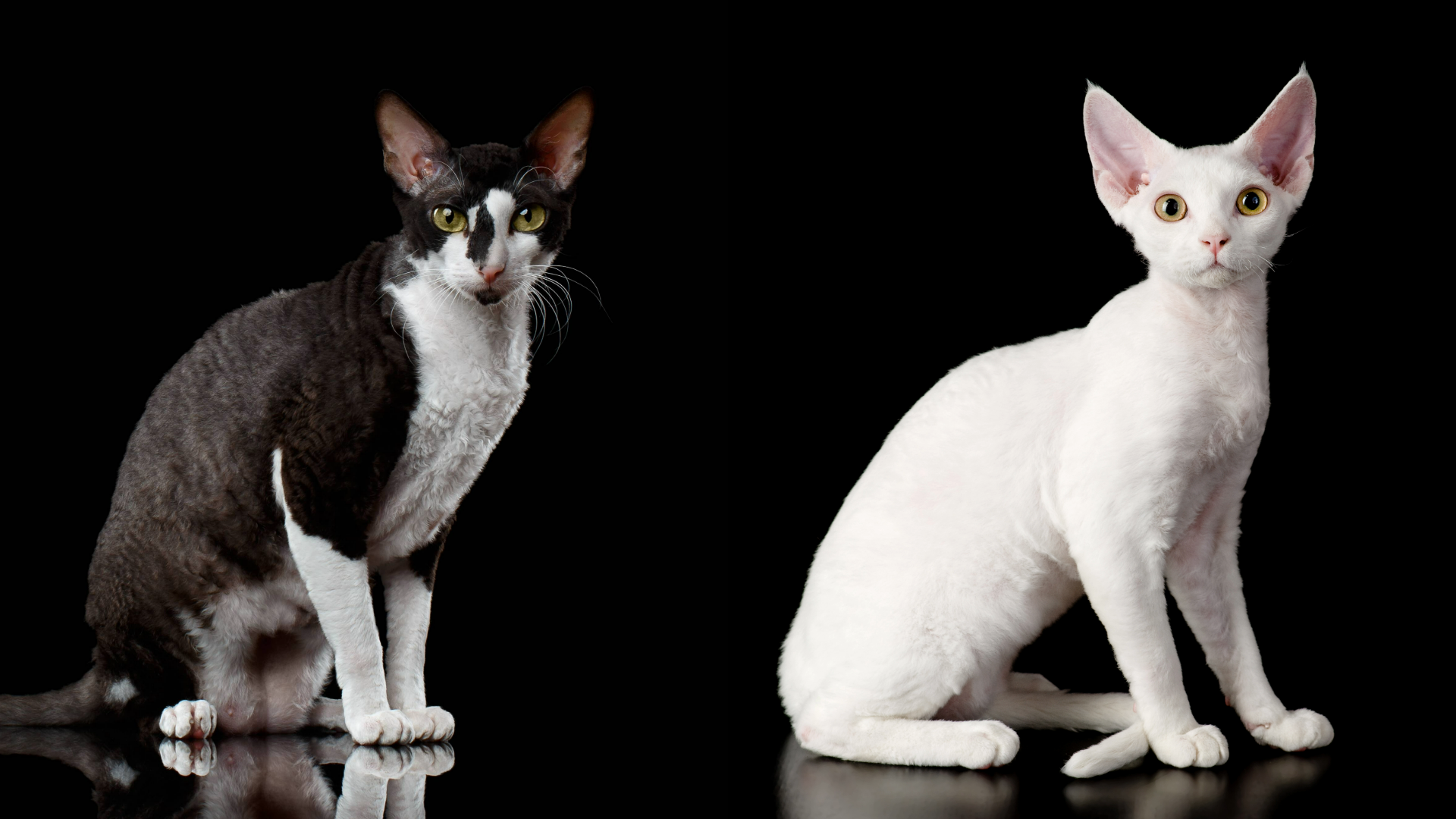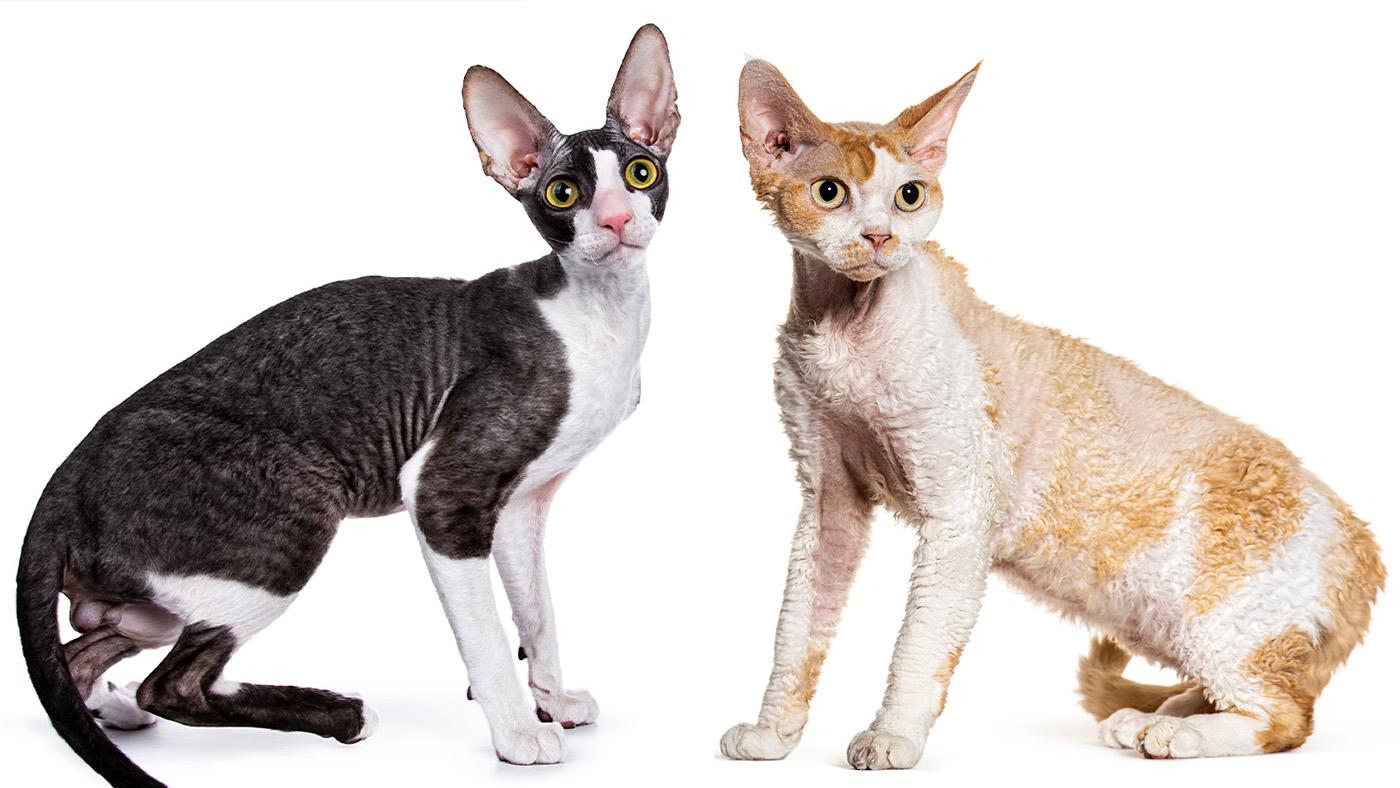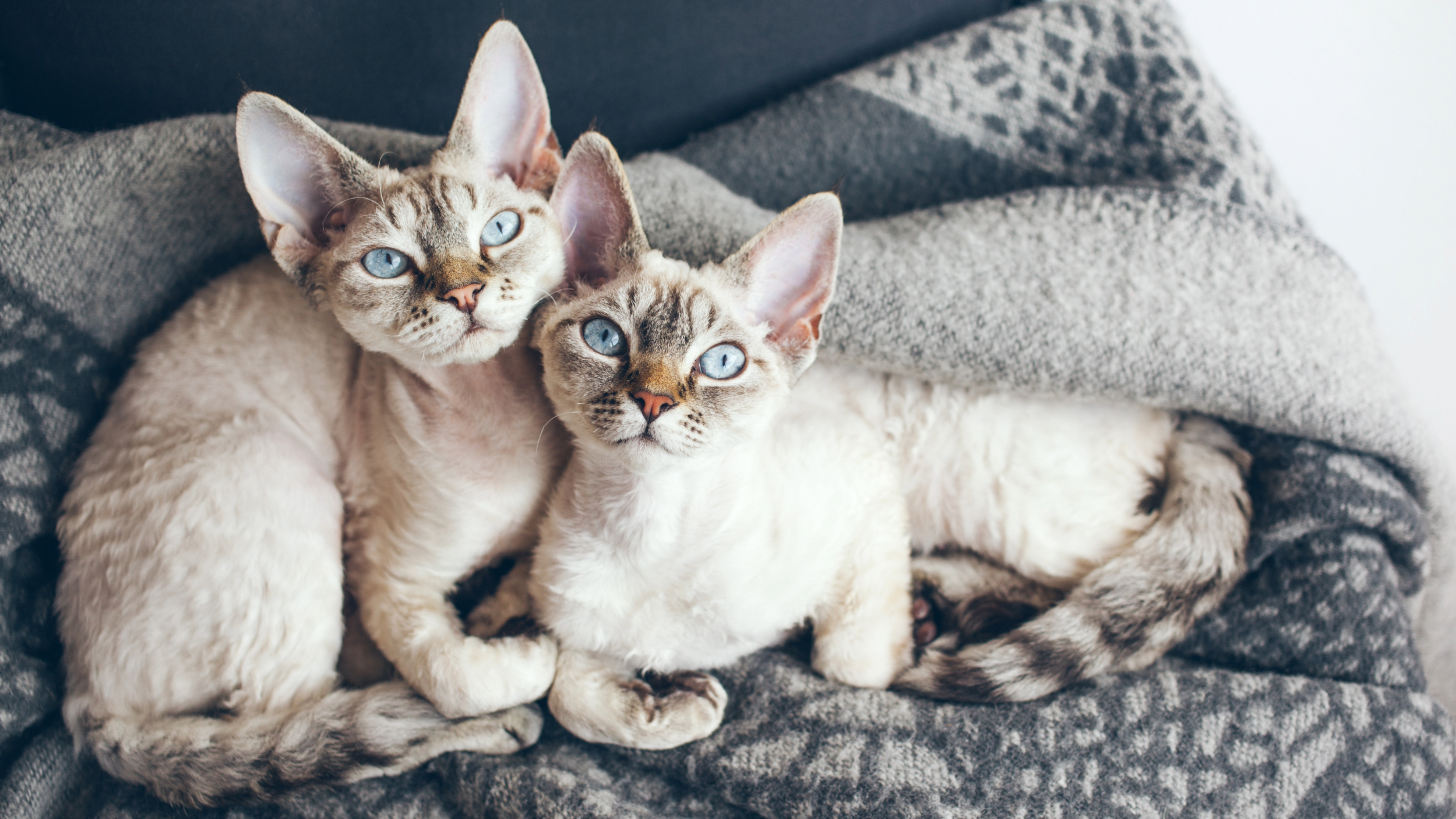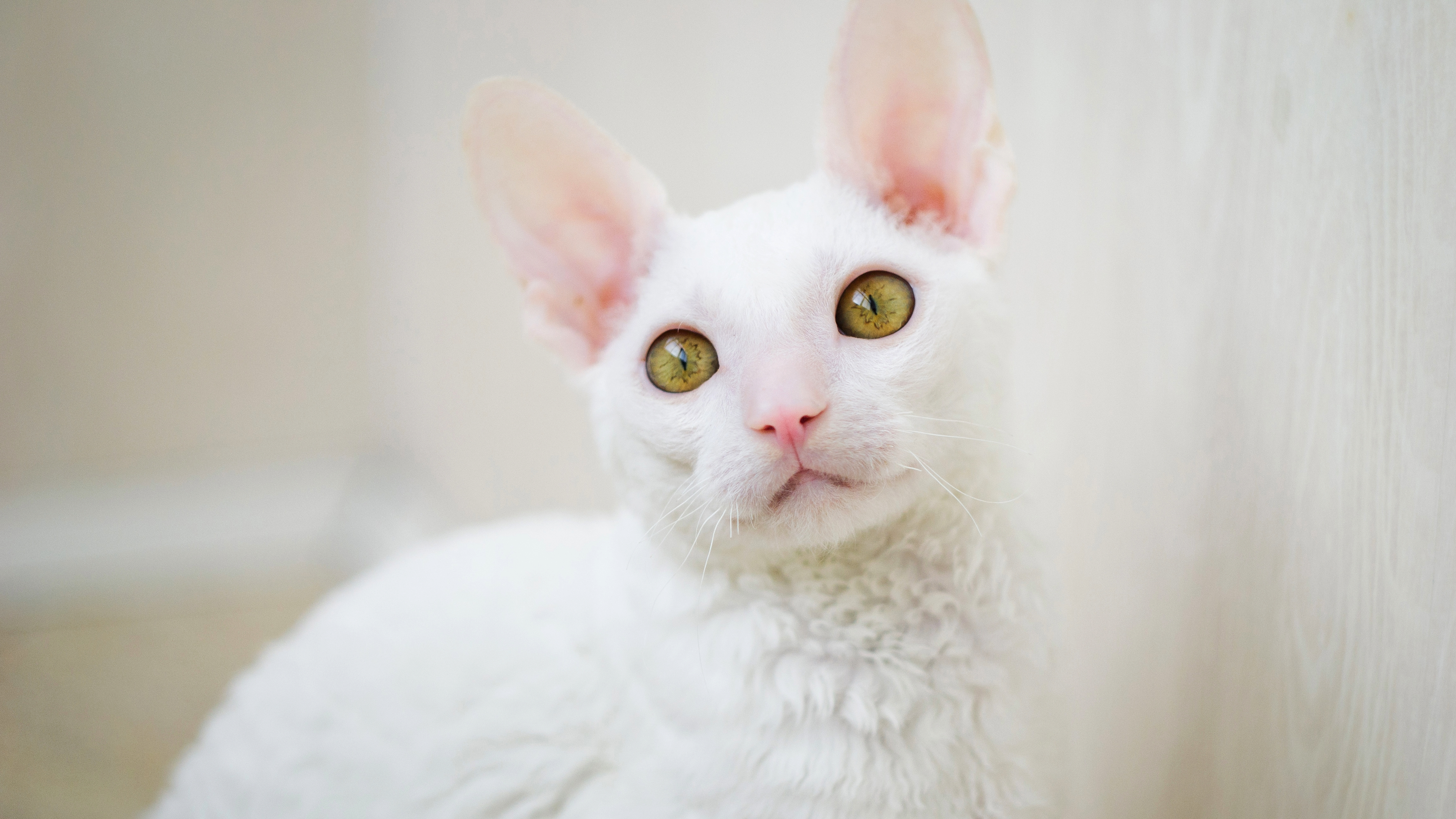Cornish Rex vs Devon Rex: The difference between these curly-coated cats
Our vet compares the Cornish and Devon Rex so you can choose the right cat with confidence

When it comes to comparing the Cornish Rex and Devon Rex, it may look like there's not much separating these two curly-coated cuties. However, look a little deeper and you'll find that while they are similar in many ways, there are some key differences that are worth being aware of.
Cornish Rex cats are known for their sleek and slender bodies and their highly energetic nature. Confident, charming, and super smart, they love to be around their owners and retain their kitten-like playfulness well into their twilight years. They have a slightly longer lifespan than the Devon Rex and suffer from fewer health issues.
The Devon Rex has adorable elfish features and, like the Cornish Rex, they're very people-orientated, active, and affectionate. They're slightly less energetic and appreciate some cuddle time when they're not playing, so they're great if you're after a more easygoing and docile companion.
While the two breeds are more similar than they are different, we spoke to expert vet Dr Rebecca MacMillan to find out about their intelligence levels, exercise and grooming needs, and the health issues you'll want to be aware of.
Size: Cornish Rex vs Devon Rex
When it comes to size, there really isn't a lot separating these two breeds. The Cornish Rex stands at around 8–12 inches and weighs roughly 6–10 pounds, while the Devon Rex measures 10–12 inches and typically weighs 6–9 pounds.
As you can see, both cats are relatively small with a petite build, however, the Cornish Rex tends to be ever so slightly larger than the Devon Rex. There's not much in it, though!
Appearance: Cornish Rex vs Devon Rex

At first glance, it's easy to think that the Cornish Rex and the Devon Rex are one and the same. But look a little closer and you'll soon notice that both of these breeds have distinguishing features that set them apart from one another.
Get the best advice, tips and top tech for your beloved Pets
The Cornish Rex has a slender and elegant build with a long tail and large, high-set ears. They have a small, egg-shaped head, large eyes, a long nose, and a soft and wavy down coat with tight and compact curls that feel velvety to the touch. While they may look fragile, these cats are actually very muscular and sturdy.
In contrast, the Devon Rex has a more elvish appearance. Their face is broader and more triangular in shape than the Cornish Rex, and while they have the same large ears, they're lower set. Unlike the Cornish Rex who has just a single undercoat, the Devon Rex has a coat with three layers so their curls are looser and more open.
Intelligence and trainability: Cornish Rex vs Devon Rex
Can you train a cat? You can if they're a Cornish or Devon Rex!
"Both the Cornish Rex and the Devon Rex are highly intelligent and very trainable," confirms Dr MacMillan. "They can both be trained to fetch toys and do tricks with the right positive reinforcement."
The Cornish Rex and Devon Rex are natural problem solvers, and they're both eager to learn, so you'll find that, as well as mastering new tricks and behaviors, they'll also enjoy cat puzzle feeders and other challenging toys that give their brains and bodies a good workout.
Because both breeds form deep emotional connections with their humans, they are naturally inclined to want to please them, which makes training both a breeze and a whole lot of fun.
However, when it comes to teaching a cat a trick, stick to the basics with these two smart kitties – patience, consistency, and lots of praise and treats will help both of these breeds learn that much quicker.
Exercise needs: Cornish Rex vs Devon Rex

Both the Cornish Rex and the Devon Rex are active and curious cats who love to clown around and entertain their humans. They retain their kitten-like energy well into their senior years, although the Devon Rex is a little less energetic than the Cornish Rex.
"The Cornish Rex is often the more active of the two," says Dr MacMillan. "This breed particularly enjoys climbing and exploring. The Cornish Rex maintains a kitten-like personality for quite some time, which many owners enjoy. The Devon Rex is still playful, but a bit more docile than the Cornish Rex."
However, regardless of which breed you choose to go for, Dr MacMillan says that both cats will need around 30 minutes of physical activity each day, depending on their age and health status.
The good news is that because these breeds are highly active and love to play, you'll find that they adore zooming around the house with the best cat toys. You'll likely discover that different brain games for cats go down a treat as well, alongside interactive puzzles and toys.
Grooming: Cornish Rex vs Devon Rex
Looking for a feline friend who won't require more time in front of the mirror than you do? Well look no further than these two unfussy felines!
"Both the Devon Rex and the Cornish Rex have characteristically short and curly or wavy coats," explains Dr. MacMillan. "The main differences are that the Cornish Rex’s fur is a little finer and silkier, while the Devon Rex’s is a little longer.
“Both are minimal shedders with low-maintenance grooming needs. Weekly brushing with a soft brush or grooming mitten should be enough to keep their coats looking good."
While both breeds don't require much in the way of grooming, investing in one of the best cat brushes and giving them a daily or weekly brush is a wonderful way to strengthen your bond and spend quality time with your feline friend.
Health considerations: Cornish Rex vs Devon Rex

When we choose to adopt a kitten or adult cat, most of us are hoping that we'll have our new feline friend with us for as long as possible. Even the healthiest cat breeds will be prone to getting sick from time to time, and almost all breeds have certain health conditions that they're more prone to. Here's what you need to know about the Cornish Rex and the Devon Rex:
"Both cats are prone to a few hereditary health complaints, with more affecting the Devon Rex," says Dr MacMillan. The Cornish Rex also has a slightly longer average lifespan than the Devon Rex, so it could be considered the healthier of the two.
“Like many pedigree breeds, they are both affected by hypertrophic cardiomyopathy [HCM] which is a hereditary condition that causes thickening of the heart muscle. This stops the heart from working effectively and could lead to blood clots, heart failure, and sudden death in severe cases.
“Both the Cornish Rex and the Devon Rex are at low risk of developing polycystic kidney disease [PKD]. These cysts are present from birth, gradually increasing in size over time,” Dr MacMillan explains. “In some cases, this can affect the kidneys’ function, even leading to kidney failure. You should try to choose a breeder that doesn’t have HCM or PKD in their breeding lines, as this will increase the chances of having a healthy cat.
“Devon Rex can suffer from a disease that causes muscle weakness. This condition is known as Devon Rex myopathy, and problems start showing between three weeks and six months of age in affected cats. In some severe cases, the problem can be fatal. There is a genetic test available, so potential owners should purchase their kittens from a reputable breeder who will have tested their cats before breeding from them,” Dr MacMillan advises.
“The Devon Rex is also prone to a blood-clotting disorder, which can lead to bleeding problems. This hereditary vitamin K-responsive coagulopathy cannot be cured but may be managed through vitamin K supplementation.
“Both breeds are at risk of hypotrichosis due to the gene mutations that give them their abnormal coat types. This can lead to varying amounts of baldness."
Owner suitability: Cornish Rex vs Devon Rex
"Both breeds would make excellent family cats due to their sweet and playful personalities. They also have very similar care needs, though the Devon Rex is slightly more prone to health issues. Most people find the Devon Rex more laid back than the Cornish Rex however, so you will need to take this into account when deciding on the right cat for your family."
If you're looking for a real bundle of energy, the Cornish Rex may be the slightly better choice. However, if you'd like a kitty that loves to play but is equally fond of a cuddle, the Devon Rex will tick that box nicely.
Whichever breed you decide to go for, it's worth bearing in mind that neither cat is particularly independent. These are real companion kitties who like to be with their humans at all times, so you'll want to make sure you're able to give them the love and attention they need to thrive.
Read next: More facts about Devon Rex cats

Rebecca is a veterinary surgeon who graduated in 2009 from the Royal Veterinary College in London. She has a wealth of experience in first opinion small animal practice, having done a mixture of day-to-day routine work, on-call emergency duties and managerial roles over the years. Rebecca enjoys medicine in particular and she is proud to have recently achieved a BSAVA postgraduate certificate in small animal medicine (with commendation).
She writes on various feline and canine topics, including behavior, nutrition, and health. Outside of work and writing she enjoys walking her own dog, spending time with her young family and baking!
Edited by Georgia Guerin and Alexis De Leaver.
Last updated in July 2025.

Kathryn is a freelance writer who has been a member of the PetsRadar family since it launched in 2020. Highly experienced in her field, she's driven by a desire to provide pet parents with accurate, timely, and informative content that enables them to provide their fur friends with everything they need to thrive.
Kathryn works closely with vets and trainers to ensure all articles offer the most up-to-date information across a range of pet-related fields, from insights into health and behavior issues to tips on products and training.
When she’s not busy crafting the perfect sentence for her features, buying guides and news pieces, she can be found hanging out with her family (which includes one super sassy cat and a kitten), drinking copious amounts of Jasmine tea and reading all the books.
She has written for a range of publications, including Fit&Well, Top Ten Reviews, LiveScience, Goodto, and Product Hunt.
